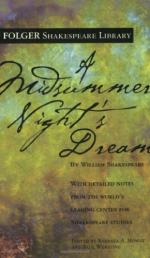|
This section contains 6,900 words (approx. 23 pages at 300 words per page) |

|
SOURCE: Nuttall, A. D. “A Midsummer Night's Dream: Comedy as Apotrope of Myth.” Shakespeare Survey 53 (2000): 49-59.
In the following essay, Nuttall contends that in A Midsummer Night's Dream, Shakespeare used comedy to suppress, however incompletely, the darker aspects of the myths that influence the play.
Hippolyta, I wooed thee with my sword, And won thy love doing thee injuries. But I will wed thee in another key— With pomp, with triumph, and with revelling.
(1.1.16-19)
Thus Theseus, benignly, to Hippolyta in the opening scene of A Midsummer Night's Dream. Everyone watching, in 1595 or 1596, would have known that the speaker was an important personage. He enters, splendidly dressed (we may be certain) and, according to the Folio stage direction, ‘with others’ (rightly interpreted by Theobald as implying a train of attendants). His speech contrives, within a small compass, to be stately. It at once receives from Egeus, a kind...
|
This section contains 6,900 words (approx. 23 pages at 300 words per page) |

|


